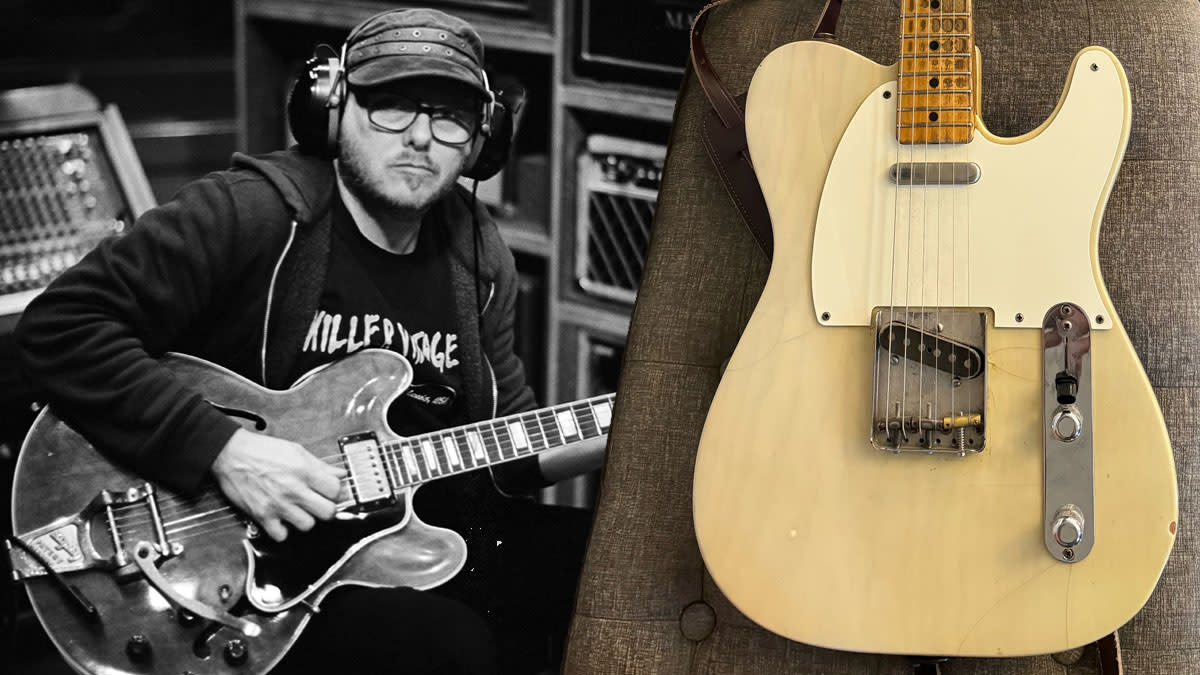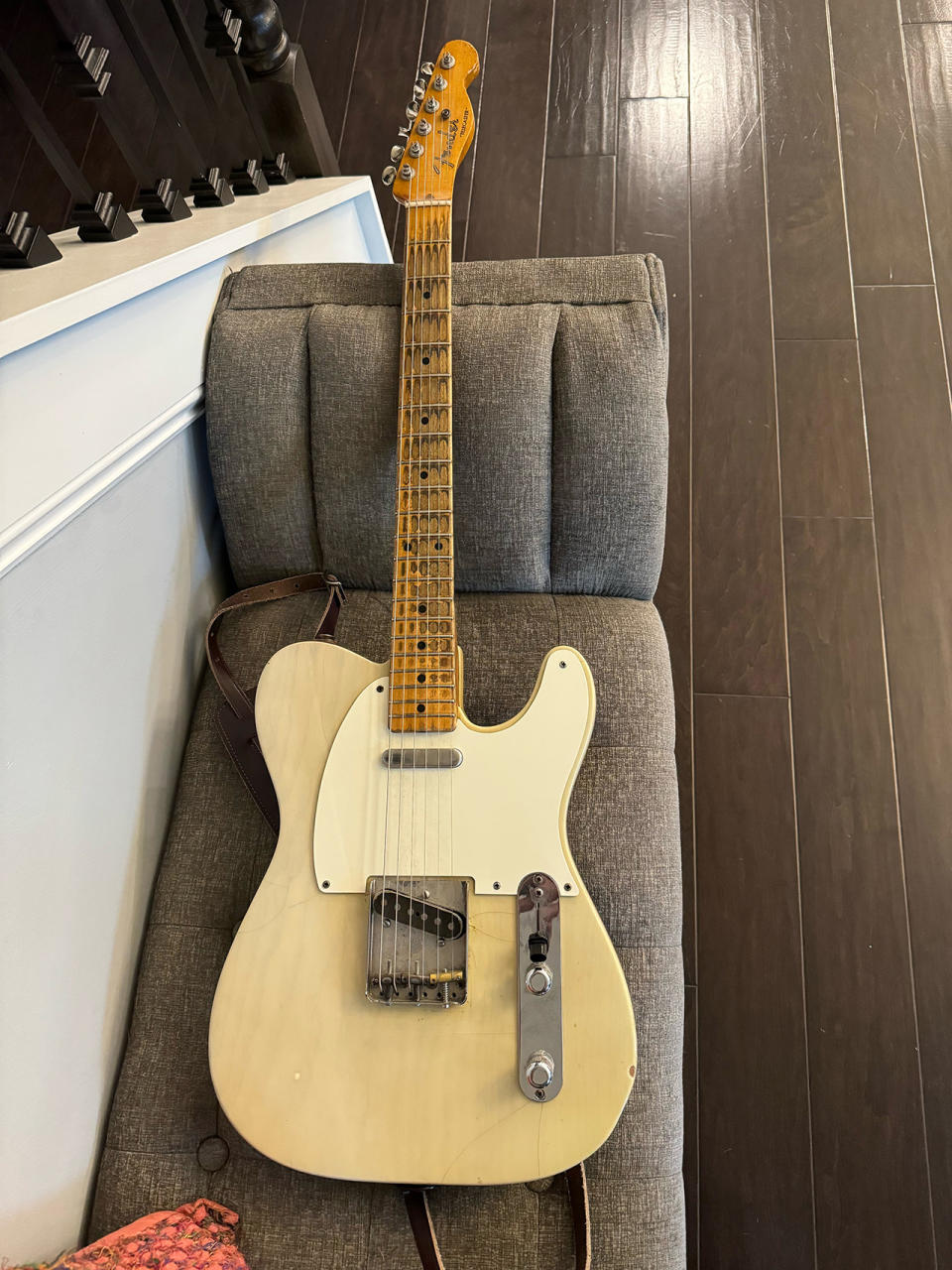Nashville session master Rob McNelley on his emotional reunion with his dad's '55 Tele

- Oops!Something went wrong.Please try again later.
As if playing alongside seminal country artists like Luke Bryan, Kenny Chesney, Miranda Lambert, Lee Ann Womack and Wynonna Judd wasn’t enough, Nashville-based Tele-toter Rob McNelley is a three-time winner of the Academy of Country Music’s Guitar Player of the Year.
It’s well-earned – with his twangy yet bluesy and soulful sound filling the airwaves, McNelley is proud when he reflects on the sessions that mean the most. “There’s a lot of them,” he says. “But when I recorded Need You Now with Lady Antebellum [now known as Lady A – Ed], that was such a big song that it put me out there. When everybody seemed to find out about me, it was because of that song.”
He hasn’t only impacted country records – he’s done blues too. “Man, playing on Buddy Guy records is really cool,” he says. “I’ve idolized him since I was a teenager, and I’ve read so much about him. But to actually meet him and hear him tell all these stories about his life while we’re in the studio, that’s a highlight for me.
“And getting to work with producer Jay Joyce on the Eric Church stuff – those sessions have always been very fun. Jay is so creative so the Eric stuff is cool.”
While McNelley’s session career is booming he’s working on his next solo record, which won’t be country-oriented – to the surprise of some. “It’s more rock,” he explains. “And people don’t know that I sing; these are actual songs with lyrics and vocals.
“It’s not a guitar instrumental record, which is what people automatically assume before they hear it. I have yet to aspire to make an instrumental record, but you never know. Maybe I will someday.”
What inspired you to pick up the guitar?
“I grew up in a household where my dad, Bobby Gene McNelley, was a musician. People came around all the time playing guitars. By the time I was about eight years old, I had my own guitar and I was getting started. It was such a way of life in our house so it was just something I did.”
Do you remember your first guitar?
“Yeah. Sadly, I don’t have it. It was a Hondo nylon-string acoustic. I thought it was cool because I really liked Willie Nelson. It looked like his guitar, but a brand-new version of it.”
And what about your first proper guitar?
“By the time I was 10, my dad had a really cool ’61 Gibson SG Junior. I guess it’s called the Les Paul SG Junior – whatever. And I’m pretty sure I had some kind of custom amp; that was my first amp. I don’t even know what it was.”
When did country music become something that you were not just a fan of but could see yourself doing professionally?
“My dad was a country musician and songwriter, so that music was always on in the house, and at my grandparents’ house. But when I started playing seriously, and trying to get into bands in high school, I was playing rock music. Country music was just something in the background at that point.
“Years later, when I decided to move to Nashville, I realized I could fit in there because I grew up with that music. And I do love that kind of music – it's not like I didn't like it. It's just that nobody else my age played that. If I was going to be in any bands, I played rock music. Getting to Nashville was almost more like coming back to my roots.”
From your vantage point, especially as a young player, how inspirational was Nashville?
“These days there’s a lot more going on in Nashville than just country music. There’s so many players from all over living here now. So the bar is high for how good the musicians are here, you know? These days it seems to be more guitar-centric than ever.”
How did session work become a path you chose?
“I totally fell into it. When I moved here, it wasn’t on my radar to be a session musician at all. It just started happening when I was playing with Delbert McClinton. People just started asking me to do it here and there. And then, before you knew it, I was doing it every week, a couple of days a week. It just snowballed, to be honest.”
What do you need in your toolbox to be a successful session guitarist?
You’ve got to be a positive person, even if you don’t think the idea is right. That’s not your job
“A lot of it is personality things more than playing. Obviously you’ve got to be at a certain level of playing to be able to execute the ideas needed. You’ve got to be well-versed in a bunch of different styles and be able to play them well. But the other thing is you’ve got to have a lot of humility, because you’re gonna put ideas out there and people are not gonna like all of them.
“They’re gonna tell you, ‘Try something else,’ and they’re not gonna say it nice sometimes! They’re gonna say it like, ‘No, I really hate that, try something else.’ You’ve got to have thick skin and not take those things personally. Just take them as somebody who’s got different levels of ability to communicate. You’re trying to help them get the sound in their head out to the speakers.
“So, thick skin, humility, and a lot of patience with people. And you’ve got to bring a good vibe to the room – you’ve got to be a positive person, even if you don’t think the idea is right. That’s not your job.
“Your job is to get their ideas out there, and when they need your help and want creative input from you, that’s when you have the floor. Until then, you’re trying to help them get their sound.”
I remember my dad laying the case on the floor… I opened it, and right away I knew it was a special guitar
You’ve worked with some of some the biggest names in the industry, so your guitar playing is woven into the sound of modern country in a way that very few players are.
“Wow – well, I never thought about that! I mean… I guess so! There’s a handful of us that play on all these people’s records, and now you put it that way… it's crazy to think about. I don’t even know what to say about it.
“But yeah, I guess that is kind of true. For as long as I’ve been doing it, there’s a sound that I guess people probably associate with me – whether they know it or not.”
How would you describe that sound, in the spirit of helping listeners identify it?
“I guess I’m maybe unique next to my direct peers in that I came up through blues and soul music. When I was learning how to play I got immersed in playing lots of rock ’n’ roll, blues and soul gigs. Maybe that’s something about me – I lean a bit more into soul and I bring all that stuff.”
What are a few pieces of gear that you’d never go into a session without?
“One of my old Strats, one of my old Teles, and probably a Les Paul. I can get most things done with those three guitars. Amp-wise, a Fender Deluxe Reverb. And pedal-wise, a Boss Distortion DS-1 or an Analog Man King of Tone overdrive. I can get a lot done with just all of that.”
Which guitars mean the most to you?
“The Strat and the Tele were both my dad’s; I inherited those when he passed away. The Tele is a 1955 one that he bought when I was about 10 or 11. I remember him bringing it home and showing it to me; I remember him laying the case on the floor, and I opened the case, and right away, even at that age, I knew it was a special guitar.
“I played it a lot when I was a kid whenever he had it around the house, when it wasn’t on the road with him. Years later, when he passed, that guitar was not around and I didn’t know what happened to it.

“He’d made some records in Nashville with Paul Worley in the ‘80s, and apparently sold it to Paul. I found that out through a mutual friend, and then when I connected with Paul for the first time down here, we talked about that guitar.
“I told him that if he ever sold it, or wanted to get rid of it, to contact me first. At the time I was new to town and I was broke. I was like, ‘Well, he’s probably not going to get rid of it… and even if he does, I don’t have the kind of money these things go for.’
First and foremost, get to Nashville. This is one of the last real active studio communities where bands track every day
“About six months after that, our mutual friend called and said, ‘Hey, come over to the house tonight. I need you to check something out.’ When I walked in, there’s a guitar case on the floor. It was like the first time I opened the case again, like déjà vu – it was the Tele. My friend said, ‘Paul wants you to have it back.’
“Ever since, that guitar goes with me to every session. It’s my main Telecaster and by far the most meaningful guitar in my collection, with the most meaningful story behind it. And Paul also put me on my first Number One hit – he hired me on Lady Antebellum stuff, so he’s done a lot for me.”
Can you name some notable sessions the Tele can be heard on?
“Oh, my goodness, man. There’s so many. There’s some newer stuff that Riley Green is doing with Dan Huff – it’s all that Tele. It got me on those records because Riley did a demo session with me when he first got his record deal, and every time I played that guitar, he was like, ‘That is my sound right there.’ So I use that guitar on everything I play with him.”
What advice would you give somebody thinking about getting into country session work?
“First and foremost, get to Nashville. This is one of the last real active studio communities where bands track every day. If you want to do that, you’ve got to get here. And when you get here, have some patience; it’s gonna take some time.
“There are more musicians than there are gigs so it takes a long time to gain a producer’s trust. Having your playing together goes without saying – you got to be at the level that any producer will like.
“From there, it just takes you a while to meet everybody. If you can play, somebody’s going to hear you, and somebody’s going to use you on something eventually. But you’re gonna have to meet a lot of people first.”

